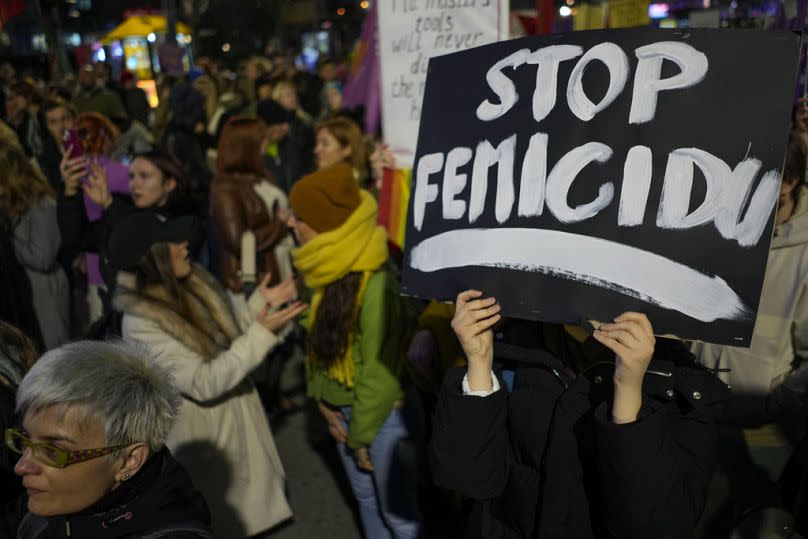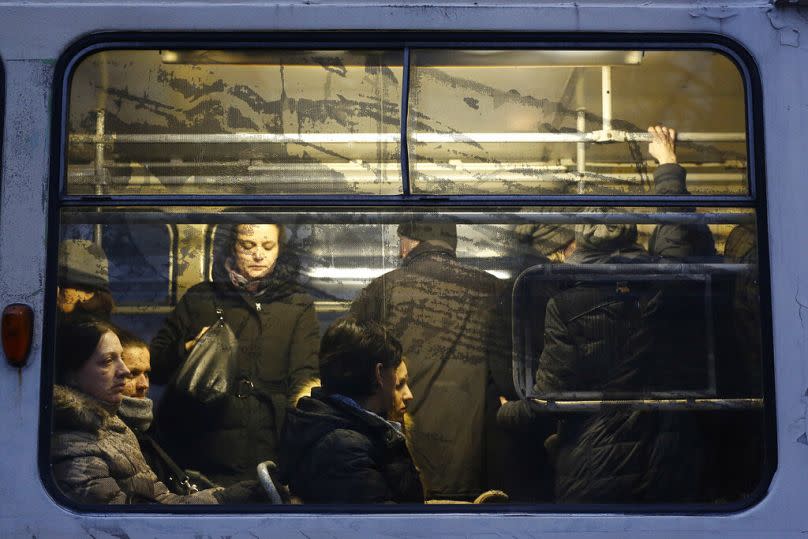Women are being murdered in the Western Balkans, and it is time to take action

On 17 April, Kosovo President Vjosa Osmani declared a national day of mourning to commemorate all women and girls killed through femicide.
That week, two Kosovar women, Gjyljeta Ukella and Erona Cokli, were killed by their husbands, bringing the number of femicide cases to 55 since 2010, in a country of only 1.8 million people.
This is not just one country's problem. The number of women and girls who have been murdered in the Western Balkans is tragically on the rise.
Femicide, defined as the gender-related killing of women and girls, is the most extreme form of violence against women. In the Western Balkans, gender-based violence — particularly femicide — remains a severe and wide-reaching threat.
In 2020 and 2021, over 100 women were killed in the Western Balkans, around half of whom were from Serbia. Women from ages 46 to 55 were most likely to be victims of femicide, with 20% of victims under 30 years old.
Half of femicide victims were killed by their husbands or ex-husbands, and in their own house or apartment.
While femicide has been documented worldwide, the Western Balkans is especially susceptible to this tragic phenomenon.
As patriarchal gender norms are deeply entrenched in the region, power imbalances between men and women are particularly strong at home and in the public sector. The gender pay gap ranges from 20 to 39%, as women’s socioeconomic status lags far behind the men’s.
Why is femicide especially prevalent in the Western Balkans?
The Western Balkans is unique for its legacy of war, economic insecurity, and history of conflict-related sexual violence against women. These factors have contributed to an environment of poverty, conflict, and intergenerational trauma, where domestic violence is widely accepted as part of the status quo.
Studies have shown that women with lower socioeconomic statuses tend to face more domestic violence. Given the economic insecurity in Western Balkans, and women’s relatively lower socioeconomic status to men, it is unsurprising that there has been a rise in femicide and domestic violence in the region.

Among the Western Balkan countries, significant gender gaps in pay and labour market participation rates are felt most acutely in Kosovo, North Macedonia, and Bosnia and Herzegovina.
With their higher poverty rates and lack of resources, in these countries, domestic violence is especially on the rise.
Is the brutal murder of Marigona Osmani a tipping point for Kosovan society?
Euronews moderates Reddit Q&A on how to end violence against women
Further, femicide in the Western Balkans is exacerbated by the region’s history of conflict-related sexual violence against women.
While women’s bodies became targets of rape during the Yugoslav armed conflicts in the 1990s, they have continued to be objectified, sexualised, and abused in the 21st century.
Over half of women in Bosnia and Herzegovina have survived intimate partner violence, or some other form of abuse, since the age of 15.
Survivors of wartime rape continue to face marginalisation and discrimination, with women’s bodies still framed as ethnonational “territories” designed to be conquered by omnipotent men who face little or no accountability for their criminal conduct.
Violence left undocumented and made invisible
Despite national strategies to combat domestic violence, there is little institutional protection for victims in the Western Balkans.
Few domestic violence shelters exist in the region, and public services for survivors are severely underdeveloped. Laws to combat domestic violence remain poorly implemented.
As survivors receive little legal support or protection, few women speak out about the brutalities enacted against them. According to an OSCE study, nearly half of Bosnian women have faced abuse, with 84% of cases left unreported.

From 2020 to 2023, 139 cases of femicide were documented in Serbia, Albania, and Montenegro.
This means that 26 out of every one million women in these countries have been killed during this period. However, due to issues of underreporting, the actual number of femicides is likely much higher.
Shock and protests in Bosnia as woman's murder is streamed live on social media
'There is huge resistance': Europe's problem with violence against women
Even fewer cases of femicide make national or international headlines.
In August 2023, a Bosnian gunman live-streamed the murder of his ex-partner, Nizama Hećimović, on Instagram. Three months later, another Bosnian woman was murdered at home by her ex.
While these cases were duly reported on, dozens, if not hundreds, of additional femicide cases in the Western Balkans are largely left undocumented.
Can policymakers do something?
Femicide in the Western Balkans is not only a major human rights issue, but also an emerging public health crisis. Without immediate interdiction in the cycle of violence by institutions, this epidemic will continue unabated, and even grow.
Femicide must be recognised as a serious criminal offence by national legislation, and gender-sensitive training using “best practices” must be provided to judges and prosecutors through required legal education.
Civil society organisations such as the Kosovo Women’s Network and the Autonomous Women’s Center in Belgrade currently provide legal support for women victims of gender-based violence.
However, stronger implementation of women’s rights and protections is urgently needed on a national level.
To start, domestic violence shelters, helplines, and psychosocial care and job training must be established or expanded for women and children in each country.
Civil society organisations and domestic violence shelters must be funded and trained in data collection in partnership with government agencies, to gain a more accurate assessment of the prevalence of gender-based violence in the region.

On the domestic side, parliaments in the Western Balkans must take aggressive steps to draft legislation that incentivises police, social workers, prosecutors, and judges to adopt a victim-centred approach to access to justice. This must include legal enforcement of protection orders and follow-up on open domestic violence cases by police agencies.
Ministries of justice in the region must also adopt gender-sensitive measures to retrain police, prosecutors, and judges, and enact laws to protect victims of gender-based violence. Rights of access to legal aid and psychological counselling must also be codified in legislation for victims of gender-based violence.
On the global front, international development agencies should assist Western Balkan governments and NGOs in funding these necessary programs and gender-sensitive training. International organisations should fund public awareness campaigns about femicide and how domestic violence victims can obtain help in communities, treating it as an emerging public health crisis in the Western Balkans.
In the name of those killed, stop this cycle of death and tragedy
By recognising femicide as a serious criminal offence, expanding shelters and psychosocial care, and supporting data collection and follow-up on open cases of domestic violence, Western Balkan institutions and policymakers can play a pivotal role in saving the lives of women — potentially upwards of 50 per year.
If these measures were to be adopted, this could result in 500 women saved from femicide in the Western Balkans over the next decade.
Yet, today, one woman in the Western Balkans is dying nearly every week, and this figure is only rising.
Steps must be taken immediately to interdict the cycle of domestic violence: failure to do so will result in more deaths and tragedy.
In the name of Gjyljeta Ukella, Erona Cokli, and so many more, it is time for Western Balkan policymakers to combat femicide now. Inaction is not an option.
Alex Chen is an independent researcher who has published on human rights and politics in the Balkans and Eastern Europe. Tanya Domi is an Adjunct Professor of International and Public Affairs at Columbia University and the Harriman Institute. She also served in the US Army as a Military Police Captain who specialised in the investigation of domestic violence and sexual assault.
At Euronews, we believe all views matter. Contact us at view@euronews.com to send pitches or submissions and be part of the conversation.

